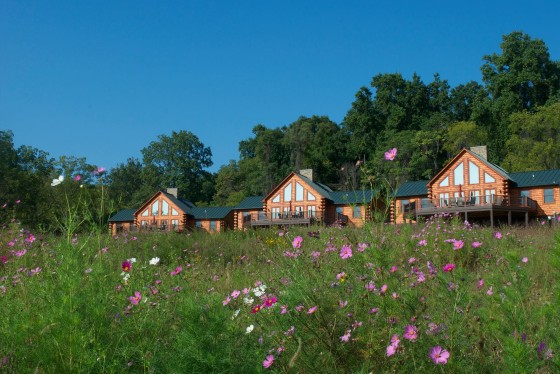WASHINGTON — For the last five years, Ken Falke has helped thousands of combat veterans overcome the stress, anxiety and trauma of war at his 37-acre Bluemont, Virginia retreat, Boulder Crest. Now, he wants to help others find the same peace — namely the 43.8 million Americans who struggle with mental health issues each year.
Falke and his team of therapists and wellness experts, many of whom are veterans themselves, don’t treat their guests with traditional PTSD methods and medication. At Boulder Crest, it’s all about an alternative approach called post-traumatic growth (PTG).
Simply put, PTG is learning how to find strength in trauma and then growing from that experience. Think of the common saying, “What doesn’t kill you makes you stronger.” At Boulder Crest Retreat, they’re tapping into that philosophy.
“Everybody defines trauma differently, and really what we hope that comes out of it is that people identify and can self-identify that they’re struggling and that struggling is OK, and that the after effects of struggling can be very powerful,” said Falke, a retired Navy veteran.
“What really happens in this science of post-traumatic growth is that we’re trying to look at what you can do on the backside of trauma to come out thriving, rather then what the mental health community really does, which is get you to a place of surviving.”
Boulder Crest Retreat’s PTG-based program, PATHH, is currently undergoing an 18-month evaluation, and data collected thus far proves promising. (According to Falke, the PTG-approach is “about two- to three-times more effective then traditional mental health care.”)
Results show PATHH participants experienced a 50 percent reduction in depression and anxiety, and a 40 percent reduction in stress. The data also points to a 75-percent improvement in the participants’ level of psychological, spiritual and relationship growth.
“What we’re doing with veterans seems to be working very well,” said Falke, who added that the same can be true for civilians.
Falke’s new book, “Struggle Well,” which he co-wrote with Boulder Crest’s Executive Director Josh Goldberg, shares steps and strategies for applying PTG to any type of stress or trauma — not just those that result from combat.
“I just ask everybody not to be too turned off by the cover, because it looks military, but it’s really written for (everyone),” said Falke, who added that when dealing with mental health, “we’ve really got to take a different approach.”
So what, exactly, is PTG? It’s defined and measured by five domains, according to experts, including deeper, more meaningful relationships; personal strength; spiritual and existential change; a sense of appreciation for life; and the ability to recognize new possibilities.
Throughout “Struggle Well,” Falke and Goldberg share personal stories and map out strategies to help readers achieve PTG. A critical part in all of it is building a network of healthy, supportive relationships and “pruning” out the connections that are toxic.
Falke said if you’re struggling, you want to surround yourself with “people that aren’t quick to give advice, aren’t telling you how to live your life, but can sit there and listen to you, because sometimes that’s all we need is to get it off our chest.”
He added, “As humans, we thrive on relationships, we are committed to quality relationships, and when you have toxic ones in your network, it’s brutal.”
Self-regulation is another key point to staying on the path to overall wellness.
“We always tell people, those who can’t self-regulate, self-medicate,” said Falke, who explained that Boulder Crest Retreat uses activities such as equine therapy, meditation and horticultural therapy to instill regulation practices.
In addition to helping people immediately, Falke hopes his organization’s work in PTG, and “Struggle Well,” helps to change the course of care when it comes to mental health.
“There’s just not a lot of innovation in this space. I don’t understand it, I’m trying to understand it better, but really I think the start, and one of the easy points, is for people to understand the science of growth. Because even if you continue to use the (common) treatments that you use — the prolonged exposure and the cognitive processing therapy — but you start to have conversations about growth and health and wellness after trauma, it just changes the perspective of the patient and the client significantly,” he said.
“There are some small things we can do, but really what’s needed is a large amount of money and a large amount of innovation.”
Then, he added, “It just seems like the country’s in a bit of a funk right now and we’re just trying to do our part to help people get better and get through life in a meaningful way.”








